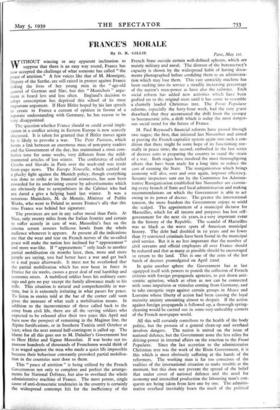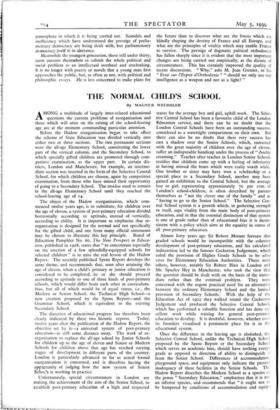FRANCE'S MORALE
WITHOUT wincing or any apparent inclination to suppose that there is an easy way round, France has now accepted the challenge of what someone has called " the peace of attrition." A few voices like that of M. Montigny, Deputy of the Sarthe,are still raised in protest against France risking the lives of her young men in the " age-old quarrel of German and Slav, but this " Munichois " argu- ment is heard less and less often. England's decision to adopt conscription has deprived this school of its most important argument. If Herr Hitler hoped by his last speech to create in France a current of opinion in favour of a separate understanding with Germany, he has reason to be very disappointed.
The question whether France should or could avoid impli- cation in a conflict arising in Eastern Europe is now scarcely discussed. It is taken for granted that if Hitler moves again he is likely to provoke a war. The Petit Parisien, which forms a link between an enormous mass of non-party readers and the Government of the day, has maintained a stout com- bative tone for some weeks, very different from the mild- mannered articles of last winter. The conference of exiled Czechs and Slovaks in Paris over the week-end was made front-page news. The Europe Nouvelle, which carried on a plucky fight against the Munich policy, though everything was done to strike at its financial resources, has now been rewarded for its undeviating course by advertisements which are obviously due to sympathisers in the Cabinet who had not dared a give a helping hand last winter. It was a notorious Munichois, M. de Monzie, Minister of Public Works, who went to Poland to assure France's ally that this time France was behind her signature.
The provinces are not in any softer mood than Paris. At Nice, only twenty miles from the Italian frontier and certain to suffer acutely in case of war, Mussolini's face on the cinema screen arouses bellicose howls from the whole audience whenever it appears. At present all the indications are that the wear and tear on French nerves of the so-called peace will make the nation less inclined for " appeasement " and more war-like. If " appeasement " only leads to another partial mobilisation six months later, then, more and more people are saying, you had better have a war and get back to a real peace afterwards. It must not be overlooked that the partial mobilisation which has now been in force in France for six weeks, causes a great deal of real hardship and economic stress. A mobilised soldier loses his ordinary earn- ings and gets no pay except the family allowance made to his wife. This situation is natural and comprehensible in war- time, but it is extremely irritating in what passes for peace. To listen to stories told at the bar of the corner café soon gives the measure of what such a mobilisation means. In addition to the inconvenience of those called back to the army from civil life, there are all the serving soldiers who expected to be released after their two years this April and have now the prospect of remaining in the Maginot line, the Alpine fortifications, or in Southern Tunisia until October at least, when the next annual half-contingent is called up. The blame for all this goes not to M. Daladier's Government but to Herr Hitler and Signor Mussolini. If war broke out to- morrow hundreds of thousands of Frenchmen would think of it as waged against the men who made a quiet life impossible because their behaviour constantly provoked partial mobilisa- tion in the countries next door to them.
This " peace of attrition " is being utilised by the French Government not only to complete and perfect the arrange- ments for National Defence, but also to overhaul the whole administrative machine of France. The most potent, single cause of anti-democratic tendencies in the country is certainly the widespread contempt felt for the inefficiency of the French State outside certain well-defined spheres, which are mainly military and naval. The distrust of the bureaucracy's capacity is shown by the widespread habit of having docu- ments photographed before confiding them to an administra- tion which may lose them. This vast unwieldy machine has been sucking into its service a steadily increasing percentage of the nation's man-power as have also the railways. Each social reform has added new activities which have been grafted on to the original stem until it has come to resemble a clumsily loaded Christmas tree. The Front Populaire reforms, especially the forty-hour week, had the very grave drawback that they accentuated the drift from the country to bureaucratic jobs, a drift which is today the most danger- ous social trend for the future of France.
M. Paul Reynaud's financial reforms have passed through two stages; the first, that initiated last November and aimed at putting the French capitalist system again into such a con- dition that there might be some hope of its functioning nor- mally in peace time; the second, embodied in the last series of decrees aims at preparing the country to stand the strain of a war. Both stages have involved the most thoroughgoing efforts that have been made for a long time to reduce the cost of running the State. The reorganisation which brings economy will also, over and over again, improve efficiency. Seventy inspectors sent out by the Committee for Adminis- trative Reorganisation established last November are examin- ing every branch of State and local administration and making recommendations on which the Government is able to act owing to its power of decree. The greater the international tension, the more freedom the Government enjoys to wield the scalpel. The appointment of a municipal dictator for Marseilles, which for all intents and purposes has lost self- government for the next six years, is a very important event in the history of the Republic. The scandal of Marseilles was as black as the worst spots of American municipal history. The debt had doubled in to years and no fewer than 77 convicted criminals have been found in the municipal civil service. But it is no less important that the number of civil servants and official employees all over France should be reduced and that as many as possible should be encouraged to return to the land. This is one of the aims of the last batch of decrees promulgated on April 22nd.
In quite another sphere the Government has at last equipped itself with powers to punish the collusion of French citiiens with foreign propaganda agencies, to put down anti- semitic agitation, which as often as not can be connected with some impulsion or stimulus coming from Germany, and to take energetic steps against certain groups in Alsace and Lorraine whose liberty of action had been causing the loyal majority anxiety amounting almost to despair. If the action against foreign propaganda is followed up, a thorough spring- cleaning would be carried out in some very unhealthy corners of the French newspaper world.
All this will certainly contribute to the health of the body politic, but the process of a general clean-up and overhaul involves dangers. The nation is united on the issue of national defence, but the Government none the less relies for driving-power in internal affairs on the reaction to the Front Populaire. Since the last accretion to the administrative Christmas tree was the work of the Blum Government, it is this which is most obviously suffering at the hands of the reformers. The working man is far too conscious of the realities of the international situation to make trouble at the moment, but this does not prevent the spread of the belief that under cover of national defence and the need for economy and intensified production the labouring man's con- quests are being taken from him one by one. The adminis- trative overhaul inevitably bears the mark of the political atmosphere in which it is being carried out. Scandals and inefficiency which have undermined the prestige of parlia- mentary democracy are being dealt with, but parliamentary democracy itself is in abeyance.
Meanwhile the youngest generation, those still under thirty, seem anxious themselves to submit the whole political and social problem to an intellectual overhaul and stocktaking. It is no longer with poetry or novels that a young man first approaches the public, but, as often as not, with political and philosophic essays. He is less concerned to make plans for the future than to discover what are the forces which are blindly shaping the destiny of France sand all Europe, and what are the principles of vitality which may enable France to survive. The prestige of dogmatic political orthodoxies has fallen sharply since it is evident that the most important changes are being carried out empirically, at the dictate of circumstances. This has certainly improved the quality of recent discussions. " Why," asks M. Jean Grenier, in his " Essai sur PEsprit d'Orthodoxie" " should we only use our intelligence as a weapon and not as a light? "















































 Previous page
Previous page